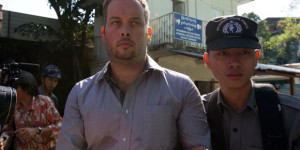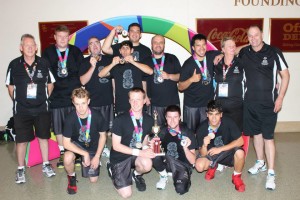It’s a good thing I thought of a saint this week before I watched the rugby last night. Australia beat the All Blacks, and I have to be honest – Australia deserved the win. It’s all a bit depressing. Later this afternoon New Zealand time it’s likely to get worse too; the Silver Ferns, New Zealand’s national netball team, is playing the Australian Diamonds, and the odds are in Australia’s favour. Despite all this though this week’s saint is a sporting one again.
Update 5.45 PM NZT: YIPPEE!!! I was wrong!!! The Silver Ferns played brilliantly! They’re just beaten the Diamonds 52-47, breaking their two year winning streak. 😀
There were plenty of candidates for sinner this week, the major one being Donald Trump. His comments about women in general during the GOP presidential primary debate, and about Megyn Kelly in particular on CNN afterwards were appalling. Kelly is not the lightweight Trump suggests – she’s tough, fair and smart. You don’t find me defending Fox News commentators very often, but his childish response to her getting under his skin just demonstrates why he’s unfit to be president. Perhaps he expected a Fox News moderator to go easy on him, but that’s never been Kelly’s style. However, I’ve saved the brickbat for a more serious issue than someone who’s unlikely to win the GOP presidential nomination.
SINNER OF THE WEEK
Government of Burma/Myanmar
I wrote back in March about New Zealander Philip Blackwood who is in prison in Burma/Myanmar for blasphemy. The level of his offence was about as innocuous as it gets, but he was jailed for 2½ years with hard labour. In addition, of course, the conditions in prisons in the country are appalling. He sleeps on a pallet, and the toilet in the cell is just a hole in the floor. Wikipedia describes Insein Prison in Yangon, where Blackwood is held, as being, “notorious worldwide for its inhumane and dirty conditions, abusive techniques, and use of mental and physical torture.”
 So what did Blackwood do? He and two colleagues posted the picture on the left on the Facebook page of V-Gastro, a tapas bar he manages. It was to advertise an event to occur a few days later. As soon as the bar/restaurant was advised it was considered offensive, they took the image down and cancelled the event. It was only on Facebook for a few hours.
So what did Blackwood do? He and two colleagues posted the picture on the left on the Facebook page of V-Gastro, a tapas bar he manages. It was to advertise an event to occur a few days later. As soon as the bar/restaurant was advised it was considered offensive, they took the image down and cancelled the event. It was only on Facebook for a few hours.
When I originally decided on this week’s sinner, I was going to present it to the New Zealand government for not doing enough to help Blackwood. However, that would have been unfair and unreasonable. It’s not the New Zealand government’s fault that Burma has a corrupt government in thrall to the right-wing monks, and it’s not certainly not their fault that Blackwood grew up in a society where freedom of speech is the norm and people are pretty relaxed about differing opinions.
 One thing that a series of New Zealand governments is responsible for though is failing to repeal our blasphemy law. When our officials talk to their counterparts in Burma, the argument that Blackwood comes from a culture where this sort of thing is not considered a problem is undermined by the fact we still have a blasphemy law. New Zealanders are invariably surprised when they discover it exists, even those who frequently use broadcasting standards to try and ban the broadcast of things like those episodes of South Park.
One thing that a series of New Zealand governments is responsible for though is failing to repeal our blasphemy law. When our officials talk to their counterparts in Burma, the argument that Blackwood comes from a culture where this sort of thing is not considered a problem is undermined by the fact we still have a blasphemy law. New Zealanders are invariably surprised when they discover it exists, even those who frequently use broadcasting standards to try and ban the broadcast of things like those episodes of South Park.
The reason Philip Blackwood is back in the news this week (as he should be every week) is that until recently there was some hope he would be released by presidential amnesty. As part of national celebrations, 7,000 prisoners were released and it was hoped Blackwood would be one of them. It must be so hard for Blackwood and his family to have been looking forward to that event, only to have their hopes dashed at the last minute. OneNews reports:
Mr Blackwood’s father, Brian Blackwood, has said the family is extremely disappointed and feels let down by authorities in Myanmar and the New Zealand Government.
Prime Minister John Key says he understands more will be done for Philip Blackwood.
“I think it’s fair to say the Government’s keeping a close eye on the situation,” Mr Key told reporters.
“With all of these things we do the best to provide support. But in doing so we want to make sure we don’t make potentially the situation worse.”
Mr Key says it’s obviously very understandable that the family of Mr Blackwood are very disappointed he wasn’t on the list.
“My understanding is that there will be some more work done, if I can put it in those terms. But that’s for another day,” Mr Key said.
Brian Blackwood has said his son is innocent of the charges because he had no intention of insulting religion and posting the image was just a mistake.
Blasphemy Laws must be abolished worldwide. Please check out the International Coalition Against Blasphemy Laws Charter here, and consider adding your name to the petition of the End Blasphemy Laws campaign.
SAINT OF THE WEEK
New Zealand Special Olympics Team
The New Zealand team to the Special Olympics returned home on Wednesday with a huge haul of 32 medals – 11 gold, 12 silver and 9 bronze. They did incredibly well and did the country proud.
This Olympiad, the Special Olympics were held in Los Angeles. There has been widespread praise for the fantastic job done by the Americans in hosting the event, and how well all the athletes were looked after. The New Zealand team certainly seems to have thrived in the atmosphere!
Special Olympics New Zealand trains over 7,000 athletes in thirteen Olympic sports each year. They conduct more than 200 events in around forty towns and cities around the country to select the best. Dozens of sponsors and hundreds of volunteers help in the running of their programme. As part it, they also run a Healthy Athletes screening programme to monitor the health of the athletes to make sure they don’t suffer from any health issues as a result of their involvement.

Medalists Grant McKenzie and Sherryl Saunders being congratulated on their return home. (Source: Southland Times)
One of the athletes deserves special mention even above all the others: Sherryl Saunders not only won a gold medal for breaststroke, she was awarded the Jill Vernon trophy for sportsmanship in aquatics. The decision was apparently unanimous. Saunders was unfailingly supportive to her teammates, especially those who were struggling, said officials. For many of the athletes it was their first time away from their families, let alone away from New Zealand, but they handled it superbly thanks to teammates like Saunders, and as their medal haul shows.



Thanks Heather. What is netball? Is it what we call basketball?
The Myanmar government is certainly oppressive. Their treatment of the Rohingya Muslims is abominable, and has received too little attention, due, I believe, to prevailing Islamophobia in the western world. It also reveals that Buddhism is subject to the same intolerance as other religions.
Issues of freedom of speech have also been prominent in the US recently. Donald Trump was disinvited from a conference at which he was to have been keynote speaker, for his remarks about Megan Kelly during and after the Republican debate. How is this different from the withdrawal of an invitation to Ayaan Hirsi Ali to speak at Brandeis, which was decried by some as a violation of freedom of speech?
Then there is the case of Steven Salaita who was fired by the University of Illinois for his tweets on Gaza last summer, critical of Israel. Apparently some major donors convinced the Chancellor to fire him. Salaita sued. A federal judge has just refused to dismiss Salaita’s lawsuit against the university for violating his free speech, and the Chancellor has resigned. Somehow, certain outspoken defenders of free speech in universities, who are adamant in defending the free speech of those who criticize Islam and Muslims, seem to have missed this one. Perhaps because Salaita’s speech criticized Israel’s treatment of Muslims? It’s easy to defend the free speech of those you agree with. Apparently, it’s also easy to ignore much more serious violations of free speech that one doesn’t agree with.
https://www.popularresistance.org/u-of-i-chancellor-resigns-over-her-firing-of-prof-over-gaza/
Your thoughts?
Netball is different – it has seven players, and except for national and international games, is usually played outside. Initially only women played it (and it had nine players then as well) but there are men’s leagues now. It developed from basketball. The ball is slightly lighter and players throw the ball rather than bouncing it, except for bounce passes. There are designated positions, and they are restricted to certain parts of the court. Only two in each team are allowed to shoot baskets. The court is broadly similar to a basketball court, but the shooting circle is a semi-circle and the basket is slightly lower.
I heard about Erik Erickson’s withdrawal of his invitation to Trump over Trump’s remarks. Trump can say what he wants, but he also has to take the consequences. Assuming the conference was organized by a privately funded organisation, they are free to dis-invite him in changes circumstances. It would be different in NZ because pre-election debates are official events, so candidates get to attend whatever they’ve said on the campaign trail.
If the University of Illinois if publicly funded and Salaita spoke in a private capacity, he shouldn’t have been fired imo. However, if it’s a private university, they have the right. The influence of big money in all sorts of places is an issue in the US, which I’m pretty sure you agree with me is a bad thing.
An organisation can have employment conditions about employees bringing it into disrepute, and I don’t have a problem with that as long as it’s up front. In those circumstances if an employee was a member of the KKK and it didn’t affect how he carried out his job or treated his colleagues, and his KKK activities were kept separate, he should keep his job. If something happens to change that, such as making loud and public anti-black, anti-Semitic, or anti-gay statements, he shouldn’t expect to keep his job.
As for the Brandeis/Hirsi Ali situation, I saw that as more hypocritical than a freedom of speech issue. They had the right to dis-invite her as a private organisation. Imo though, they only did it because they bowed to pressure from some groups with the agenda of shutting down any criticism of themselves (which managed to get support from others), and lied about not knowing about her views previously. The situation with Trump came up after the invitation had been made. The organisation felt the need to take a particular stance about what he said and they have a right to. Hirsi Ali hadn’t changed her position or invited any new opprobrium since her invite.
Heather, when Trump was called out for his misogynistic statements, he tried to divert the subject by saying the real problem was political correctness. I think that term has been overused to the point that it is meaningless. But the older term “taboo” still has a powerful influence today.
The first three commandments are essentially taboos, as is the Jewish custom of not saying the name of god. Blasphemy laws enshrine taboos into law. There are strong taboos in Israel’s discussion of threats from its neighbors: Never admit that Israel has nukes. Never admit that Israel’s settlements prevent any possibility of a two state solution. Never admit that Israel’s treatment of the Palestinians is in any way connected to the statements of Arab leaders about Israel.
In the US it’s taboo to admit our genocide against the native Americans, and to admit that the Declaration of Independence was hypocrisy promulgated by a slave-owning nation. There’s a taboo against talking about the inhumanity of the nuclear attacks on Japan and the fire bombing of Dresden. There is a taboo about admitting that our invasion of Iraq was terrorism, and that much of the chaos in the middle east was caused by US and European greedy meddling. Woe to the politician who does not buy into “American exceptionalism”.
So while I oppose blasphemy laws and governmental restrictions on freedom of speech, I think legal impediments are just the tip of the iceberg. Social taboos and peer pressure restrict not only our speech but our thought. Some are religious in nature, but by no means all.
I think freedom of speech helps challenge those social taboos though. It may be taboo to talk about what was done to native Americans, but at least no one will arrest you if you do, and it’s possible to spread awareness of the horrors of that time. I disagree with the law in Germany in France, for example, that makes denying the Holocaust a crime. It’s better that those who hold this view get their ideas openly challenged and proved incorrect. Once you ban talking about something it makes it look like there’s something to hide, and also feeds conspiracy theory idiots. What we have isn’t ideal, but it is improving. We have to remember that freedom of speech is a relatively new concept, and we’re still getting used to it. Religion isn’t the only problem either, as you say, but the environment created by religion makes banning talking about or criticizing certain things normal.